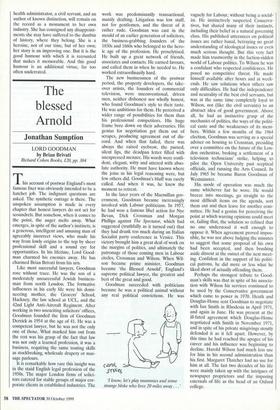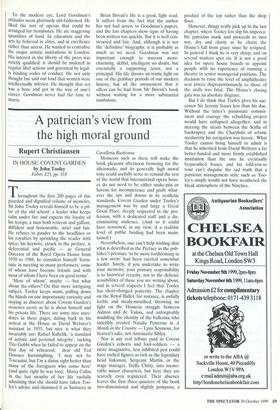The blessed Arnold
Jonathan Sumption
LORD GOODMAN by Brian Brivati Richard Cohen Books, £20, pp. 304
This account of postwar England's most famous fixer was obviously intended to be a hatchet job. The indignant questions are asked. The synthetic outrage is there. The unspoken assumption is made in every chapter that honest lawyers do not act for scoundrels. But somehow, when it comes to the point, the anger melts away. What emerges, in spite of the author's instincts, is a generous, intelligent and amusing man of agreeably incorrect views, who made his way from lowly origins to the top by sheer professional skill and a sound eye for opportunities. In his lifetime, Lord Good- man charmed his enemies away. He has charmed Brian Brivati from his urn.
Like most successful lawyers, Goodman rose without trace. He was the son of a moderately unsuccessful Jewish business- man from north London. The formative influences in his early life were his domi- neering mother, the Grocers' School, Hackney, the law school at UCL, and the 42nd Light Anti-Aircraft Regiment. After working in two unexciting solicitors' offices, Goodman founded the firm of Goodman Derrick in 1954 at the age of 41. He was a competent lawyer, but he was not the only one of those. What marked him out from the rest was his grasp of the fact that law was not only a learned profession, it was a business, requiring the same touting skills as stockbroking, wholesale drapery or mas- sage parlours.
It is remarkable how rare this insight was in the staid English legal profession of the 1950s. The major London firms of solici- tors catered for stable groups of major cor- porate clients in established industries. The work was predominantly transactional, mainly drafting. Litigation was low stuff, not for gentlemen, and the threat of it rather rude. Goodman was cast in the mould of an earlier generation of solicitors, the business-grabbing founders of the 1850s and 1860s who belonged to the hero- ic age of the profession. He proselytised. He built up a great network of friends, associates and contacts. He earned favours, and called them in when he needed to. He worked extraordinarily hard.
The new businessmen of the postwar period, the property developers, the take- over artists, the founders of commercial television, were unconventional, driven men, neither dishonest nor wholly honest, who found Goodman's style to their taste. He was ambitious for them. He perceived a wider range of possibilities for them than his professional competitors. His huge frame bore down on their adversaries, His genius for negotiation got them out of scrapes, producing agreement out of dis- cord. And when that failed, there was always the raised eyebrow, the pursed, silent lips, the deadpan letter filled with unexpressed menace. His words were confi- dent, elegant, witty and uttered with abso- lute authority. He must have known where the joins in his legal reasoning were, but few others did. Goodman's bluff was rarely called. And when it was, he knew the moment to retreat.
In the later years of the Macmillan gov- ernment, Goodman became increasingly involved with Labour politicians. In 1957, he had won a famous libel action for Nye Bevan, Dick Crossman and Morgan Phillips against The Spectator, which had suggested (truthfully as it turned out) that they had drunk too much during an Italian Socialist party conference in Venice. This victory brought him a great deal of work on the margins of politics, and ultimately the patronage of those coming men in Labour circles, Crossman and Wilson. When Wil- son became prime minister, Goodman became 'the Blessed Arnold', England's supreme political lawyer, the greatest and best of the great and good.
Goodman succeeded with politicians because he was a political animal without any real political convictions. He was
`I know, let's play mummies and some strange bloke who lives 20 miles away . .
vaguely for Labour, without being a social- ist. He instinctively suspected Conserva- tives, but shared many of their instincts, including their belief in a natural governing class. His published utterances on political issues are rather banal, betraying no great understanding of ideological issues or even much serious thought. But this very fact made him trustworthy in the faction-ridden world of Labour politics. To Wilson he was a confidant who respected confidences. He posed no competitive threat. He made himself available after hours and at week- ends. He saw solutions when others saw only difficulties. He had the independence and neutrality of the best civil servants, but was at the same time completely loyal to Wilson, not (like the civil servants) to an abstract idea of good government. Above all, he had an instinctive grasp of the mechanics of politics, the ways of the politi- cal caste and the weaknesses of its mem- bers. Within a few months of the 1964 election, Goodman was serving as a special adviser on housing to Crossman, presiding over a committee on the future of the Lon- don orchestras, broking a settlement of a television technicians' strike, helping to pilot the Open University past sceptical officials, and running the Arts Council. In July 1965 be became Baron Goodman of Westminster.
His mode of operation was much the same whichever hat he wore. He would breeze into meetings, go straight to the most difficult items on the agenda, sort them out and then leave for another com- mittee. He had a genius for perceiving the point at which warring opinions could meet or, failing that, the solution so refined that no one understood it well enough to oppose it. When agreement proved impos- sible, he was not above fudging the minutes to suggest that some proposal of his own had been accepted, and then brushing aside dissent at the outset of the next meet- ing. Confident in the support of his politi- cal patrons, he did more or less what he liked short of actually offending them.
Perhaps the strongest tribute to Good- man's skills was that in spite of his associa- tion with Wilson his services continued to be used by the Conservative government which came to power in 1970. Heath and Douglas-Home sent Goodman to negotiate with Ian Smith in Rhodesia in April 1971, and again in June. He was present at the ill-fated agreement which Douglas-Home negotiated with Smith in November 1971, and in spite of his private misgivings stoutly defended it as it fell apart. However, by this time he had reached the apogee of his career and his influence was beginning to decline. Harold Wilson had much less use for him in his second administration than his first. Margaret Thatcher had no use for him at all. The last two decades of his life were mainly taken up with the intrigues of newspaper proprietors and the imposing externals of life as the head of an Oxford college. To the modern eye, Lord Goodman's attitudes seem gloriously old-fashioned. He liked the sort of operas that could be arranged for trombones. He ate staggering quantities of food. In education and the arts he believed in elites, and in excellence rather than access. He wanted to centralise the major artistic institutions in London. His interest in the liberty of the press was strictly qualified: it should be mulcted in regular libel actions and governed by legal- ly binding codes of conduct. He not only thought but said out loud that women were intellectually inferior. He thought that sex was a bore and got in the way of one's career. Goodman never had the time to many. Brian Brivati's life is a good, light read. It suffers from the fact that the author has not had access to Goodman's papers, and the last chapters show signs of having been written too quickly. But it is well con- structed and fair. And, although it is not the 'definitive' biography, it is probably as much as we need. Goodman was not important enough to warrant more: charming, skilful, intelligent no doubt, but essentially a supporting actor, not a principal. His life throws an ironic light on one of the grubbier periods of our modern history, but all the amusement that it offers can be had from Mr Brivati's book without waiting for a more substantial tombstone.



























































































 Previous page
Previous page